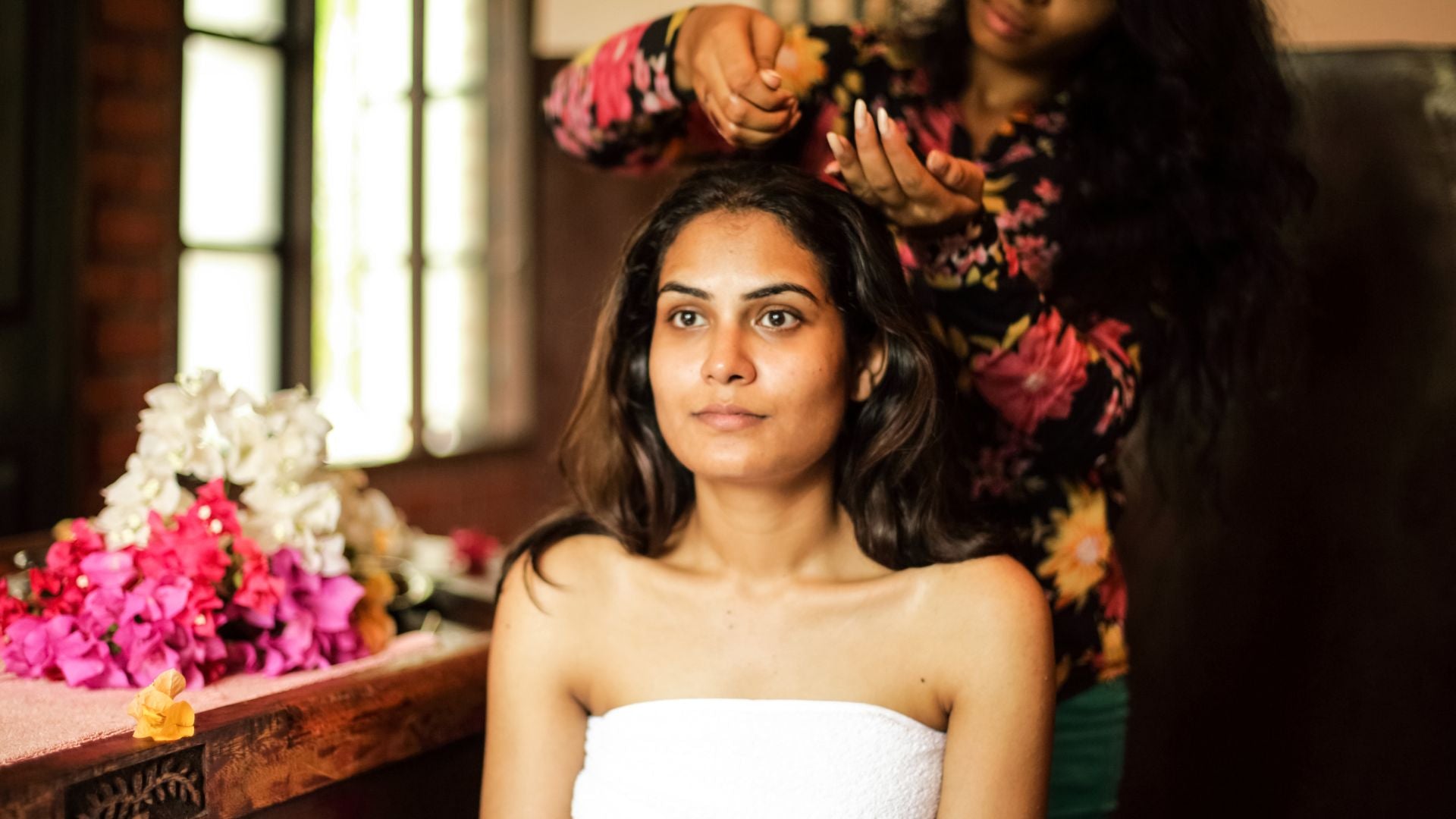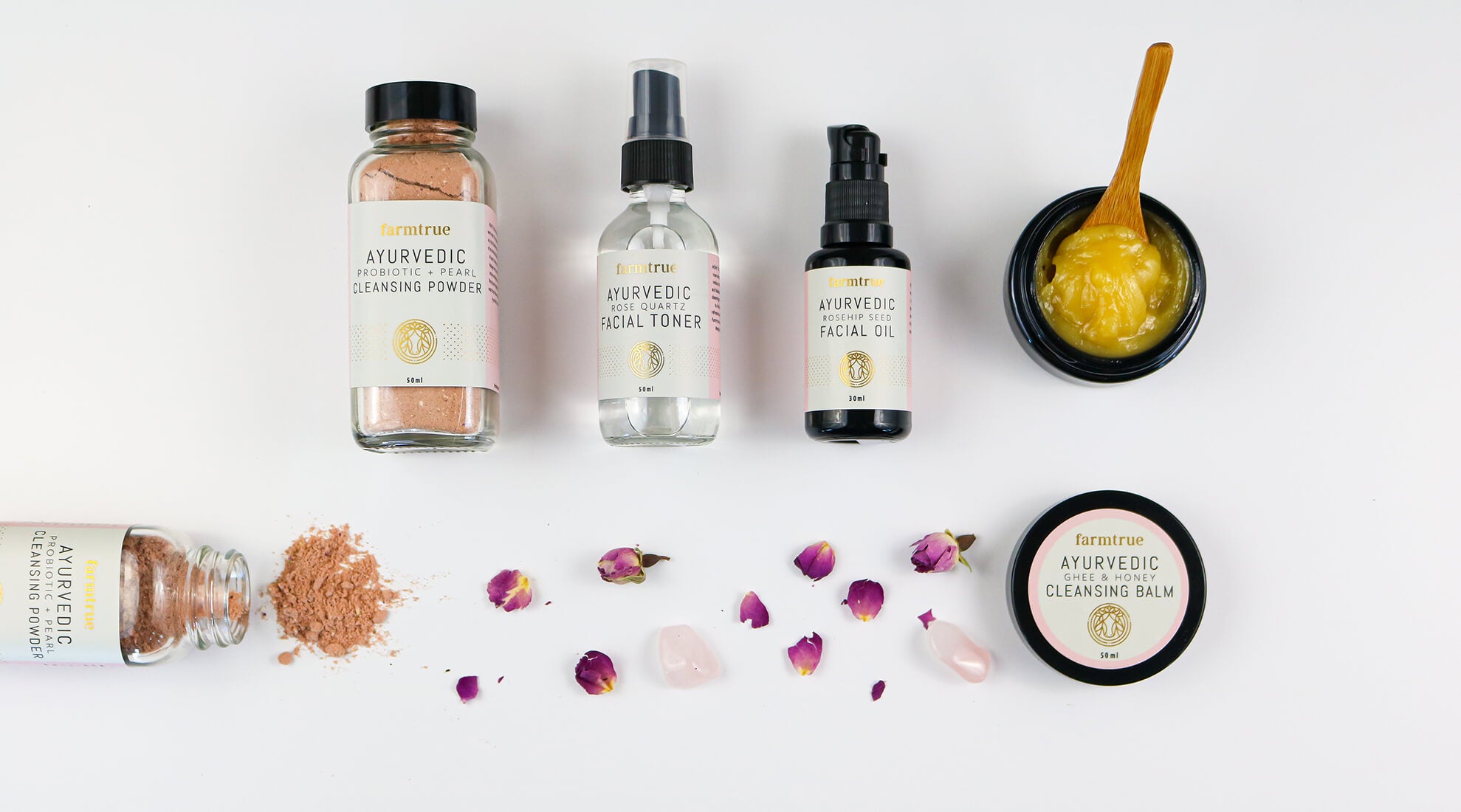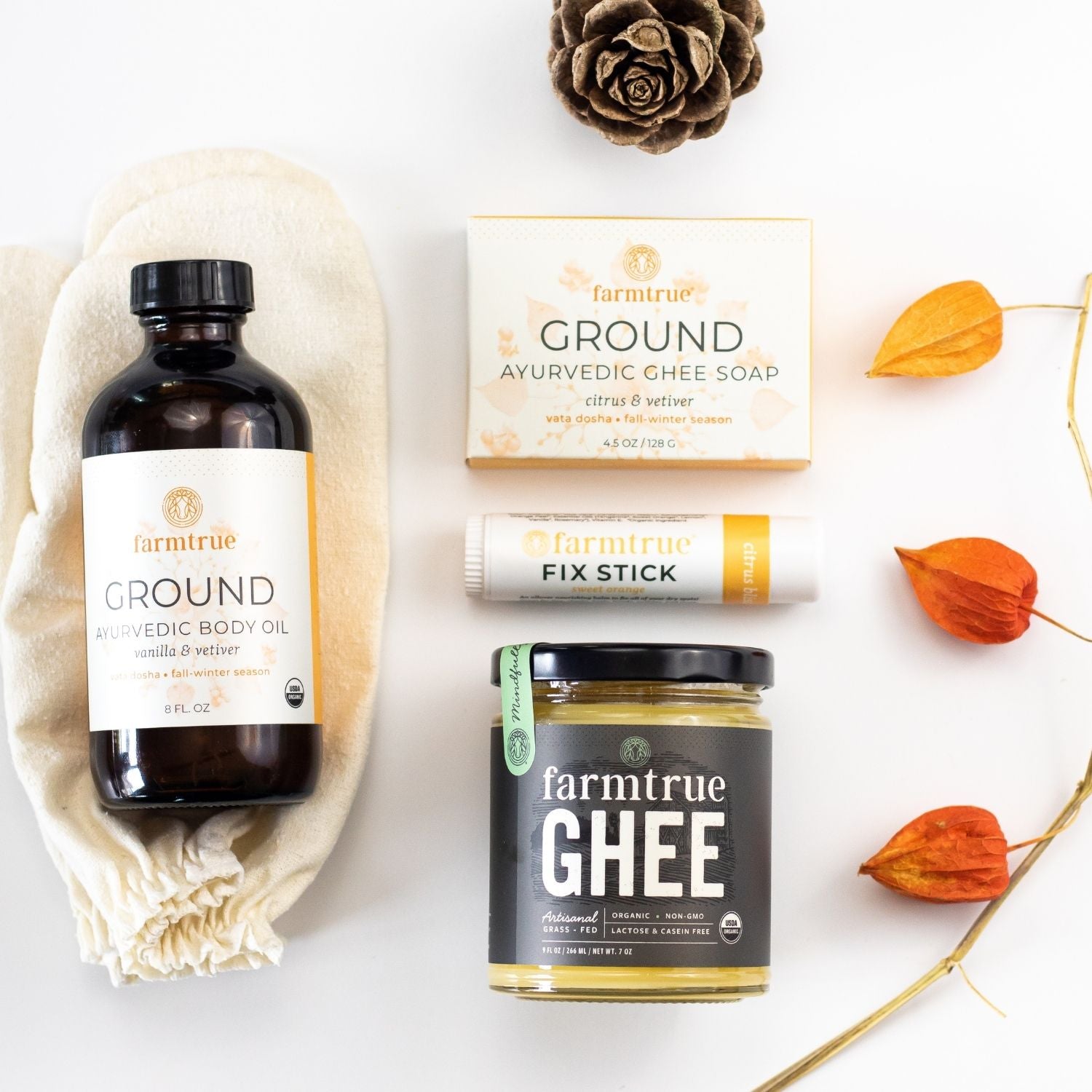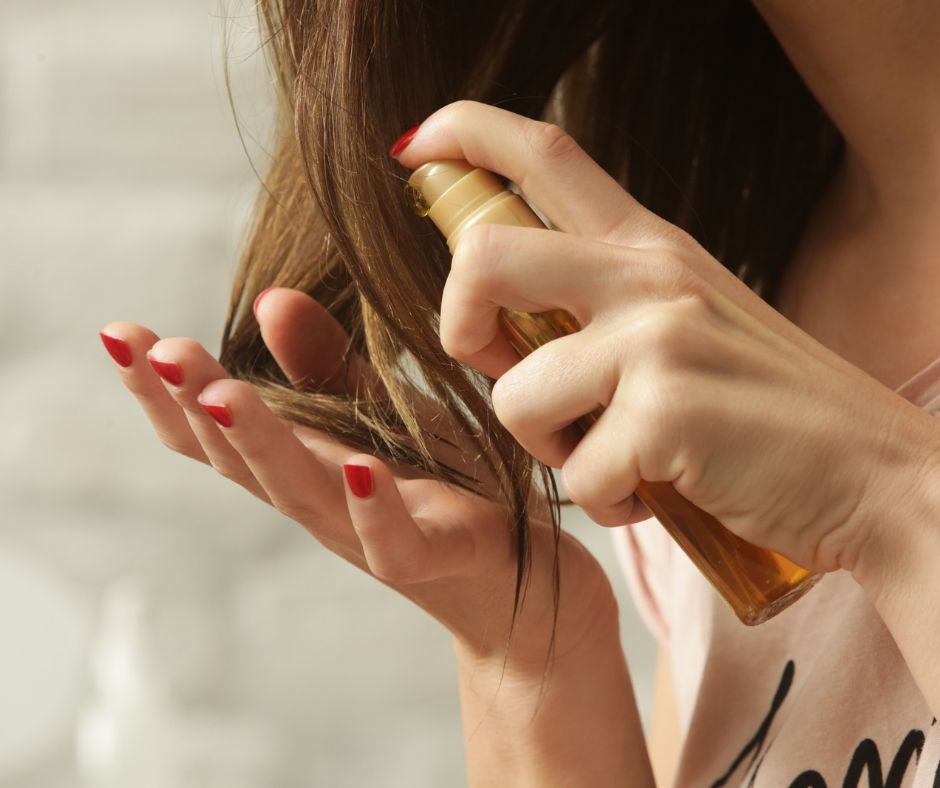
DIY Hair Care Recipes with Ayurvedic Ingredients
DIY Hair Care Recipes with Ayurvedic Ingredients

For centuries, Ayurveda, a 5000-year-old healing system from India, has held a profound understanding of life's intricacies, promoting balance in all areas, including the health of your hair.
Adopting an Ayurvedic hair routine means aligning yourself with nature, focusing on prevention, and using natural ingredients like Ayurvedic herbal powders and herbal oils to combat hair woes and attain holistic health and lustrous mane.
So, if you're tired of dealing with hair issues such as hair fall, dry, brittle strands, or unmanageable hair, and are looking to explore a path that embraces nature's wisdom, you're in the right place.
In this post, we're going to delve into Ayurvedic herbs, oils, and practices that have been used for generations. These natural solutions aim to nourish hair strands from the roots, promoting healthy, lustrous hair.
Understanding Your Hair Type According to Ayurveda

In Ayurveda, individuals are classified into three doshas or constitutions: Vata, Pitta, and Kapha. Each dosha has its unique characteristics and qualities, including hair type.
Vata Dosha
Vata types tend to have dry hair that is prone to split ends and hair loss. The key to healthy Vata hair is nourishment and hydration, which can be achieved through a monthly routine involving deep conditioning treatments and the use of herbal hair oil.
Pitta Dosha
Pitta individuals typically have fine, straight hair that is prone to thinning and graying. Caring for your Pitta hair focuses on cooling and nurturing the scalp and hair, often incorporating Ayurvedic herbs that have a soothing and cooling effect on the scalp, helping to counteract the inherent heat of the Pitta constitution.
Kapha Dosha
Lastly, Kapha types often have thick, oily, and wavy hair that can become greasy quickly. The ideal focus of a Kapha hair routine is detoxifying and stimulating the scalp and hair follicles, necessitating the use of Ayurvedic herbs and products that can cleanse without stripping natural moisture and oils.
It's essential to understand your dosha and the corresponding hair type to know what your hair needs for optimal health and growth. But remember, one size does not fit all in Ayurveda. You might resonate with characteristics across doshas; hence, an individual approach is essential.
Key Ayurvedic Ingredients and Their Benefits for Healthy Hair
Ayurvedic hair care involves the use of natural herbs and oils to nourish your hair and scalp. These potent ingredients can turn your hair wash routine into a luxurious, beneficial ritual for achieving silky hair. Let's explore some of these potent ingredients:
Aloe Vera Gel

This plant is a treasure trove of essential nutrients and antioxidants that can improve the growth of your hair. It moisturizes the hair, prevents scalp itchiness, reduces dandruff, and encourages healthy hair growth. Applying this goodness to your hair during a hair wash can result in softer, silky hair.
Sesame Oil

An excellent source of scalp nourishment, it has antimicrobial properties and helps in treating dry scalp, dandruff, and hair fall. It penetrates deep into the scalp and hair shaft, promoting lustrous, shiny hair. As part of your hair tips, consider adding this to your hair products list.
Bhringraj

Known as the "king of herbs," Bhringraj (or false daisy in English) strengthens the tip of your hair and reduces hair thinning and loss, and promotes new hair growth. It's a powerful herb found in many Ayurvedic products formulated to treat hair disorders.
Amla

This Indian gooseberry is rich in Vitamin C, and it can enhance hair texture, reduce hair loss, and prevent premature graying. Amla oil or powder can be an essential part of your Ayurvedic routine.
Neem

With its antimicrobial and anti-inflammatory properties, neem oil can alleviate scalp issues like dandruff and hair fall, stimulating the scalp follicles for healthy hair growth.
Hibiscus

This flower is rich in amino acids essential for producing keratin, the building blocks of hair. Hibiscus can help control hair loss and maintain a healthy scalp.
Rosemary

It is known for its ability to stimulate blood circulation to the scalp, encouraging hair growth. It can also help with dandruff and itchy scalp.
Nettle

Nettle helps in hair regrowth, reduces hair loss, and gives your hair a shiny, lustrous look.
These ingredients work best when used regularly as part of your Ayurvedic hair care routine. Let us delve deeper into how you can incorporate these ingredients.
Hair Care Ayurveda - Your DIY Hair Care Recipes
Embrace the natural goodness of Ayurveda with these simple DIY hair care recipes that bring together the key ingredients we've discussed.
In these recipes, we also include ghee, or clarified butter, which is considered a potent Ayurvedic ingredient for hair care.
Not only does ghee possess deeply nourishing and conditioning properties, but it is also compatible with all doshas (Vata, Pitta, and Kapha), making it suitable for all hair types.
Moreover, ghee aids in faster and deeper absorption of the other ingredients, enhancing the overall effectiveness of these treatments.
Aloe Vera and Ghee Mask
This mask is a triple threat to dry and frizzy hair. Combine equal parts of both ingredients.
Apply this mixture to your hair and scalp, working it through from root to tip.
Let it sit for about an hour before washing it off with a gentle, natural shampoo.
This mask infuses your hair with hydration, nourishment, and deep conditioning properties that tame frizz, leaving your hair silky and manageable.
Bhringraj, Amla, and Ghee Hair Oil
This potent hair oil can help revitalize your hair. Start with a handful of dried Bhringraj and Amla. Infuse these herbs in a mixture of warm ghee - a carrier oil for better absorption.
Massage this oil blend into your scalp and hair, especially focusing on your hair roots.
Let it sit for at least an hour before washing.
Doing this to your hair regularly can help reduce hair fall, strengthen hair roots, and promote hair growth.
Ghee and Hibiscus Deep Conditioning Treatment
If you're dealing with dry and lifeless hair, this is a perfect deep-conditioning treatment. Melt a couple of tablespoons of ghee and mix it with the paste made from hibiscus flowers.
Apply this to your hair and scalp, leave it on for about 30 minutes, then wash it off with a gentle shampoo.
This treatment can help restore the moisture balance in your hair, leaving it soft, shiny, and healthy.
Why add ghee?

Adding ghee to your hair care recipes not only enhances their nourishing properties but also adds a deep conditioning effect that leaves your hair feeling soft and well moisturized.
More than this, ghee serves as a medium that enhances the absorption of the other ingredients into your scalp and hair, ensuring the maximum benefit of these Ayurvedic treatments.
Its compatibility with all doshas only broadens its usability, making these recipes a universal approach to holistic health.
Complimentary Recipes to Avoid Hair Fall
Here are two additional recipes that you can add to your Ayurvedic hair care routine:
Rosemary and Nettle Hair Tonic
This tonic can stimulate your hair follicles and encourage hair growth. Steep a handful of dried rosemary and nettle leaves in hot water for 15-20 minutes. Once cool, use this herbal infusion as a rinse after shampooing.
The stimulating properties of rosemary and the hair-strengthening effects of nettle can help foster healthy hair growth and give your hair a shiny, lustrous look
Ayurvedic Hair Mask with Amla and Hibiscus
This hair mask can help to rejuvenate and nourish your hair. Make a paste using equal parts of amla powder and hibiscus powder.
Apply this paste to your hair and scalp and leave it on for about 30 minutes before washing it off with a mild, natural shampoo. This hair mask will add strength, shine, and softness to your hair, making it appear more voluminous and healthy.
Additional Ayurvedic Practices for Healthy Hair
Apart from the powerful, all-natural Ayurvedic ingredients discussed, incorporating certain practices into your hair care routine can for better hair health. Here are three key Ayurvedic practices that can help nurture and protect your hair:
Scalp Massage

The practice of scalp and regular hair massage, especially with warm herbal oils, holds a special place in Ayurvedic hair care.
Massaging the scalp improves blood circulation, ensuring a richer supply of nutrients to your hair roots, which can promote healthier and faster hair growth. It also strengthens the hair follicles, leading to more resilient hair that's less prone to breakage and falling out.
Additionally, scalp massage is known to have a calming effect on the nervous system, reducing stress levels, which are often linked to hair fall.
Using warm ayurvedic hair oils such as Bhringraj oil, castor oil, ghee, or sesame oil can elevate the benefits, adding nourishment, shine, and smoothness to your hair.
Hair Washing Techniques

How you wash your hair also plays a crucial role in maintaining its health. Ayurveda recommends avoiding hot or warm water, as it can strip the scalp and hair strands of their natural oils, leading to dry, brittle hair.
Instead, use lukewarm or cool water when you wash your hair, as it helps to maintain the natural moisture and oils in your hair and scalp, ensuring that your hair stays hydrated, shiny, and supple. Remember, a healthy scalp environment is fundamental to healthy hair growth.
Avoid Harsh Chemicals

Ayurveda always emphasizes the importance of natural care. Opt for natural and herb-infused hair care products instead of those containing sulfates, parabens, and other harmful chemicals.
These synthetic substances can be harsh on your hair, strip away natural oils, and damage the hair structure over time. By choosing natural, you're ensuring that your hair is nourished and cared for in the best possible way.
Benefits Over Bubbles
How do you know that you’re using natural hair products? Here’s a quick tip: check the lather. Most natural shampoos do not lather, and that’s actually a good thing! Lather strips away natural oils that help protect your hair.
So remember, it’s not about the bubbles but the benefits. Commercial shampoos contain sulfates, which are responsible for that rich, foamy lather. However, these sulfates can be harsh on the hair and scalp, leading to dryness and irritation.
Natural shampoos, on the other hand, often use gentle, plant-based cleansers that cleanse effectively without over-stripping. So, the next time you're in the shower and notice less foam, take it as a sign that you're giving your hair the gentle care it deserves.
Always prioritize ingredients and their effects over the sensory experience of lather. Your hair and scalp will thank you for it!
Nutrition to Improve Hair Health

Ayurveda also focuses on the importance of a balanced diet for maintaining healthy hair. Consuming a diet rich in essential vitamins and minerals can support the health of your hair from within.
Incorporate foods rich in Vitamin E, Omega-3 fatty acids, proteins, and other essential nutrients in your diet. This includes nuts, seeds, leafy green vegetables, whole grains, and healthy fats such as ghee and coconut oil.
Proper nutrition can help improve the strength, texture, and overall health of your hair.
Mindful Living for Optimal Hair Growth

To achieve overall wellness, including your hair. Here are some of the key aspects of mindful living that contribute to healthier, stronger hair:
Balanced Lifestyle
Maintaining a balanced lifestyle is at the heart of Ayurvedic principles. This includes not just physical health but also emotional and spiritual well-being.
Ensuring a regular daily routine or Dinacharya, which includes timely meals, exercise, relaxation, and sleep, can significantly influence the healthy growth of your hair.
Poor routines can disrupt your body's balance, leading to issues like indigestion and inadequate nutrition absorption, which can indirectly affect your hair.
Stress Management
Stress is a significant factor contributing to hair problems like hair fall and premature graying. Ayurveda recommends various stress management techniques to tackle this.
Meditation, deep breathing exercises, and yoga are all excellent ways to manage stress levels. Regular practice of these techniques can reduce stress, balance your body's doshas, and, over time, result in healthier hair.
Adequate Sleep
Sleep plays a critical role in the body's restorative processes, including hair growth and repair. Lack of adequate sleep can disrupt these processes, leading to hair damage and hair fall.
Ayurveda advises maintaining a regular sleep schedule and ensuring that you get a minimum of 7-8 hours of sleep each night.
Regular Exercise
Physical activity is another important factor in maintaining overall health and promoting good hair health.
Regular exercise increases blood circulation throughout the body, including the scalp, which ensures better nutrition for your hair follicles and promotes healthy hair growth.
Whether it's yoga, a brisk walk, or a workout session, make sure to incorporate some form of exercise into your daily routine.
By incorporating these Ayurvedic practices into your hair care routine, you can attain holistic hair health that goes beyond superficial treatment.
Remember, how your hair looks is an outward reflection of your internal well-being. So, taking care of your body, your mind, and your hair will show the results.
Conclusion

Ayurveda offers an enriched path to hair health, a path that is holistic and natural. Its principles and practices celebrate the unique nature of every individual.
By understanding your hair type, using Ayurvedic ingredients, and incorporating Ayurvedic practices into your routine, you can experience the transformation that Ayurveda can bring to your hair health.




